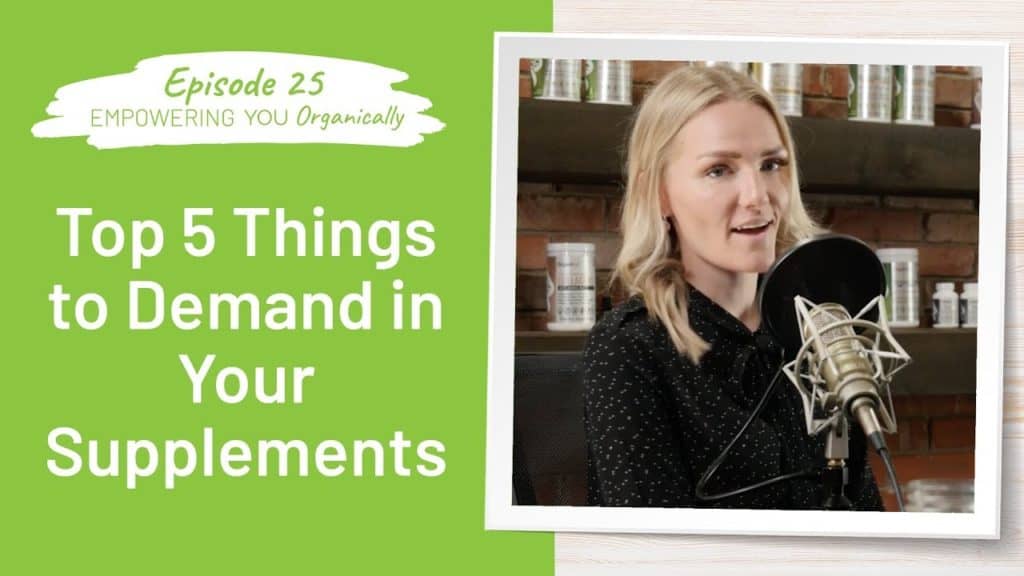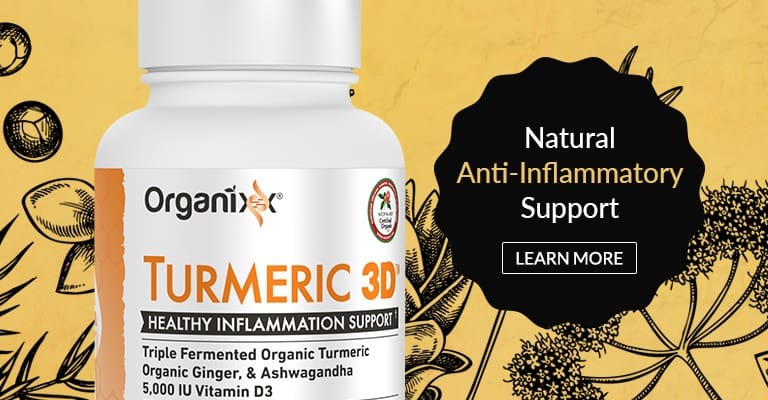Empowering you Organically – Season 4 – Episode 25
Title: Top 5 Things to Demand in Your Supplements
Hosts: Jonathan Hunsaker & TeriAnn Trevenen
Guest: None
Description: This week, with our top 5 things to demand from your supplements, we deep dive to help you become a savvy shopper. You already understand the importance of proper supplementation. Now let us help you get more bang for your buck. Did you know…many vitamin producers want you to believe that you are getting a “natural product” because it seems more wholesome to take “natural” vitamins. Unfortunately, vitamins can be labeled as natural if they contain as little as 10% of the natural form of the vitamin. This means that your “natural” vitamin could contain 90% of synthetically produced chemicals! Tune in as Jonathan and TeriAnn share some knowledge on what makes a supplement effective.
* * *
Top 5 Things to Demand in Your Supplements
“We’re so passionate about this [topic]. As we go further down the rabbit hole and we learn more and more about the supplement industry, as we make our products cleaner and cleaner and we do more and more around bringing our products to the highest quality possible, we realize that this is not something a lot of people in the industry are doing.” ~TeriAnn Trevenen, CEO of Organixx
#5 Whole Food Supplements
- 95 percent of all vitamin supplements that are out there are synthetics.
- Synthetics are usually derived as an oil byproduct.
- Your body doesn’t know what to do with synthetics so you don’t get any nutritional value.
- The best vitamin supplements are those with labeled potencies derived from naturally-occurring, full-spectrum food extracts.
- Another primary difference between real full-spectrum whole-food vitamins and synthetic vitamins is that real vitamins contain the essential trace minerals necessary for the vitamins’ synergistic operation.
- Ingesting real vitamins does not require the body to deplete its own reserves of nutrients to replace any nutrients missing from the false vitamins.)
- Watch out for unnecessary and toxic fillers.
- Look for clues on your vitamin’s label that offer insight into the origin of the vitamin. These are examples of synthetic versions:
- Vitamin A: Retinyl Palmitate
- Vitamin B1 (Thiamine): Thiamine Mononitrate, Thiamine Hydrochloride
- Vitamin B2 (Riboflavin): Riboflavi
- Pantothenic Acid: Calcium D-Pantothenate
- Vitamin B6 (Pyridoxine): Pyridoxine Hydrochloride
- Vitamin B12: Cyanocobalamin
- PABA (Para-aminobenzoic Acid): Aminobenzoic Acid
- Folic Acid: as Pteroylglutamic Acid
- Choline: Choline Chloride, Choline Bitartrate
- Vitamin C (Ascorbic Acid): Ascorbic Acid
- Vitamin D: Irradiated Ergosteral, Calciferol
- Vitamin E: dl-alpha tocopherol, dl-alpha tocopherol acetate or succinate
- NOTE: The “dl” form of any vitamin is synthetic.
#4 Make Sure Your Supplements Are Bioavailable
- Bioavailability plays a critical role in the therapeutic efficacy of supplements and medications, but conventional formulations often fail to optimize bioavailability and are unable to provide targeted treatment
- Unfortunately, the most popular delivery vehicles in the industry—mineral salts—may actually impede bioavailability. As such, an extraordinary number of medications and supplements are unable to provide patients with the best possible results.
- For a medication or supplement to be biologically active, it needs to be soluble in the fluids of the body to the point where the molecules of the active ingredient are dissociated from the inactive components, absorbed into the bloodstream after digestion, and metabolized by the liver. “If a product isn’t soluble, it gets broken down into its native components, which then sit around in the digestive tract until they’re excreted. In the absorption of things, it’s all about solubility.”
- Generating a high bioavailability product often requires advanced delivery systems that go beyond traditional formulations.
- FERMENTATION
- Predigests the nutrient for better absorption in the body.
- Example: Organixx’s collagen. It is fermented, or predigested, so the amino acids have already been broken up. If you take undigested collagen your digestive system has a hard time breaking that down. If you predigest it, all the marvelous ingredients in collagen are unlocked so your body picks up the nutrients seamlessly.
- Makes certain ingredients more available for a wider audience.
- Example: Turmeric. Curcumin, the active ingredient in turmeric, is a flavonoid. The molecule is very large and sticky. It wouldn’t get through the gut wall. When fermented the microbes break it down into smaller molecules. This allows the nutrient to be quickly absorbed.
- SPROUTING
- Once you sprout a seed, it actually unlocks more nutrients from that seed that weren’t available prior to being sprouted.
- FERMENTATION
#3 Watch out for labeling!
- Putting the word “natural” on the vitamin label is, in most cases today, deceptive. The word is constantly abused and, as such, its meaning has been diluted to a point where it holds little value.
- Many misleading labels on supplement products take advantage of the ambiguity of the word “natural” to project a wholesome marketing image, even when the product does not merit it.
- Whereas the term “naturally occurring” on a label usually means that a vitamin or nutrient is completely derived of compounds from naturally-occurring sources – the plants themselves – rather than merely containing a naturally-occurring ingredient mixed with synthetic ingredients.
- Look for organic certifications on the label.
#2 Ask for 3rd Party Test Results?
- Ask for test results from your source of supplementation.
- Challenge claims – are they using the specific form/type of ingredient they are touting in a claim?
#1 Organic Non-GMO Supplements
- USDA certified organic
- Always go organic!
* * *
Subscribe to Empowering You Organically
Never miss an episode!
APPLE PODCASTS SPOTIFY GOOGLE PODCASTS
–
Episode 25 – Top 5 Things to Demand in Your Supplements




